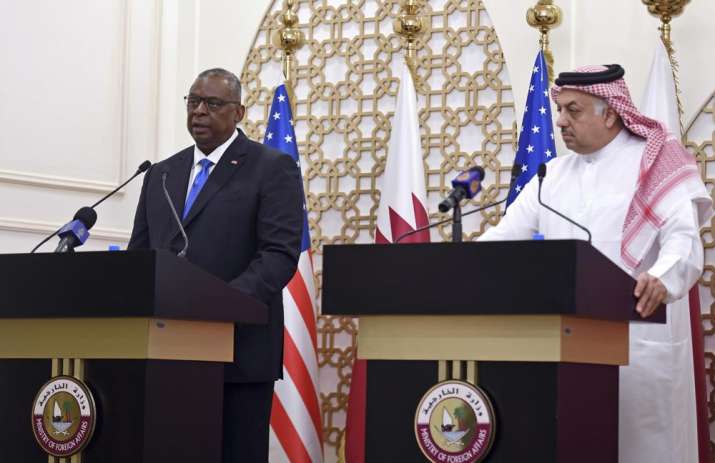
Lloyd Austin speaks during a joint PC with Qatar’s Deputy Prime Minister and Foreign Minister Mohamed bin Abdulrahman Al-Thani.
US Defense Secretary Lloyd Austin said on Thursday that the al-Qaeda extremist group, which used Afghanistan as a platform to attack the United States 20 years ago, will return to Afghanistan after the US withdrawal that left the Taliban in power. Might try to reproduce.
Austin spoke to a small group of journalists in Kuwait City at the conclusion of a four-day tour of the Persian Gulf states. He said the United States was prepared to prevent the return of al-Qaeda to Afghanistan that would threaten the United States.
“The whole community is watching to see what happens and whether al-Qaeda has the ability to reproduce in Afghanistan,” he said. “The nature of al-Qaeda and[the Islamic State group]is that they will always try to find a place to grow and reproduce, whether it is there, whether it is in Somalia, or whether it is in some other uncontrolled location. Yes. I think that’s the nature of the organization.”
The Taliban ruled Afghanistan from 1996 to 2001, providing asylum to al-Qaeda. The United States attacked and overthrew the Taliban after refusing to back al-Qaeda leaders after the September 11, 2001 attack on the United States. During the 20-year US war, al-Qaeda was significantly reduced, but questions have been raised about its future prospects with the Taliban in Kabul.
“We put the Taliban on notice that we hope they won’t let that happen,” Austin said, referring to the possibility of al-Qaeda using Afghanistan as a platform in the future.
In a February 2020 deal with the Trump administration, Taliban leaders pledged not to support al-Qaeda or other extremist groups that would threaten the United States. But US officials believe the Taliban maintain ties to al-Qaeda, and many nations, including Gulf Arab states, are concerned that the Taliban’s return to power could open the door to a resurgence of al-Qaeda’s influence.
Austin has stressed that the US military is able to deter al-Qaeda or any other extremist threat to the United States from Afghanistan by using surveillance and attack aircraft located elsewhere, including in the Persian Gulf. He also acknowledged that it would be more difficult without US troops and intelligence teams based in Afghanistan.
Austin and Secretary of State Antony Blinken appeared together in Qatar on Tuesday to express gratitude to the US for helping that Gulf state transit thousands of Afghans and others evacuated from Kabul. Blinken also visited an evacuation transit site in Germany, and Austin visited Bahrain and Kuwait.
Together, the Austin and Blinken visits were meant to reassure Gulf allies that President Joe Biden’s decision to end the US war in Afghanistan was meant to focus more attention on other security challenges such as China and Russia with the abandonment of US partners in the Middle East. does not predict. .
The US military has had a presence in the Gulf for decades, including the Navy’s 5th Fleet Headquarters in Bahrain. Biden hasn’t suggested ending that appearance, but he—like the Trump administration before him—has called China the No. 1 security priority, along with strategic challenges from Russia.
Austin, a retired Army general, has a deep network of contacts in the Gulf region, based on his years in command of US and Coalition troops in Iraq and later as head of US Central Command, which is in the Middle East. Oversees US military operations. This week’s visit, however, was his first to the Gulf since taking office in January.
Austin was scheduled to visit Saudi Arabia on Thursday as the final stop of his Gulf tour. But on Wednesday evening his spokesman John Kirby announced that the trip had been canceled due to “scheduling issues”. Kirby offered no further explanation but said Austin looked forward to a rescheduling.
Austin indicated that his visit was postponed at the request of the Saudis. “Saudi has some scheduling issues; I can’t speak to exactly what they were,” he said.
The Saudi stop was specifically to take place two days before the 20th anniversary of the terrorist attacks on the United States that killed nearly 3,000 people. Fifteen people who hijacked commercial planes on September 11, 2001 and crashed them into the Twin Towers of the World Trade Center, the Pentagon and a Pennsylvania field were Saudis, as were Osama bin Laden, whose al-Qaeda network plotted the attack. It was From its base in Afghanistan. The attack prompted the American offensive that became the 20 Years’ War in Afghanistan.
US relations with the Saudi government have been strained at times in the intervening years. In 2018, Crown Prince Mohammed bin Salman took an unprecedented crackdown against activists, rivals and alleged critics. The year culminated in the gruesome murder of the Washington Post contributing columnist and dissident Jamal Khashoggi by Saudi agents at the Saudi consulate in Turkey.
Earlier this month, President Joe Biden directed some documents related to the 9/11 attacks to be made public, a gesture to the families of the victims, who have long sought the record in hopes of implicating the Saudi government. Had it. Public documents released over the past two decades, including those of the 9/11 Commission, detail Saudi Arabia’s many complications, but have not proven government complicity.
The Saudi government denies any guilty. On Wednesday, the Saudi embassy in Washington issued a statement welcoming the move to declassify and releasing more documents related to 9/11, saying, “No evidence has ever emerged that the Saudi government or that its officers had prior knowledge of a terrorist attack or were in any way involved in its planning or execution.”
.